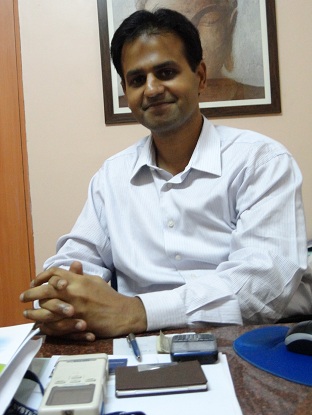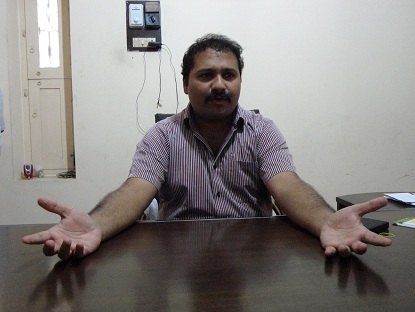Posts Tagged ‘Aravind Eye Clinic’
Increase Your Impact Or Find Your Happiness
After yesterday’s long travel – back on the road to Trivandrum, where we caught the train to Madurai – I was looking forward to a good night’s rest, but I’m abruptly hauled from my deep sleep at five in the morning when the corner shop starts the day with an excessively loud tape of Hindi songs, played to distortion-high volume.
A bad start to a great day which includes an early morning visit to the impressive temple complex (dedicated to Shiva and Pavati) and two inspiring meetings with local social entrepreneurs.
First we meet Dr Aravind Srinivasan of the Aravind Eye Clinic (www.aravind.org). The clinic is named after his uncle, who shared his name.
Aravind strikes me as a calm and collected young man, comfortable with the responsibilities he inherited from his uncle who launched the clinic several decades ago and where they are now doing more than 360 000 eye operations a year. In addition to the hospital in Madurai, they also have 42 community vision centres, developed cost-effective lens manufacturing capabilities (which enables them to make lenses at a fraction of the commercial cost) and are expanding with new projects such as a geriatrics hospital.
The 120 doctors employed by Aravind Eye Clinic sees 2 000 patients a day – by the time we meet it is 497 thus far for the day, which is the figure he reads off the real-time information system on his PC.
What sets this eye clinic apart is that it is fully self-reliant while still able to offer two thirds of their patients a free service. The power of systems and good administration allows Aravind to speak with confidence about their achievements and their plans for the future.
When the clinic launches a new project, they follow some basic guidelines to ensure success. They start out by attracting the right people into the project. They make sure they learn from what others have already done in similar projects. They emphasise that they should rather do things right than fast; and be able to change direction. And they are flexible in where they draw their resources such as finance from – even contributing themselves!
Aravind is a qualified doctor, but went back to university to complete an MBA when he realized that he enjoys seeing things come together organizationally. And he seemingly is doing a good job at managing the hospital since he took over the reins in 1993. He ascribes their success to an approach based on a clear vision of self-sustainability with a split of 60/40 for free vs paid services; measuring their success in the number of people who received sight back, rather than financial metrics; leadership based on the contribution each can make, not financial rewards; and a subtle spirituality, which underscores the values embedded in their culture.
This is not the words of a strict administrator, who exercises power to get things done! He makes use of the power of good administration, but his words are also full of love! Aravind may just be the social entrepreneur I’ve been seeking to meet who understands the subtleties of balancing love and power into a world-improving project?
Can we replicate Aravind? Can we create more social entrepreneurs like him who clearly understand the need for balancing your mission (love) with good systems (power)? With this in mind, I ask him what advice he would give a young professional, like a lawyer, doctor or engineer, who wants to make a difference to the world. And this is his advice:
– Get into the flow. Do not resist the direction life is taking you into.
– Have aspirations to achieve something good and set yourself clear goals.
– Do not allow distractions to prevent you from taking risks. Its OK to take risks!
Our visit was short – much too short , I feel as we step into the bright light outside the hospital. I wish I could spend the rest of the day shadowing Aravind, learning from him in finding the balance between love and power.
NOW the bar is set high, so it is with much anticipation that I enter the office of Akshaya Trust (www.akshayatrsut.org) to meet Narayaman Krisnan. Not only is he recipient of the CNN Top 10 Hero award, he is indeed also the hero of the 450 destitute people he feeds and care for every day.
While Aravind, who we met just 30 minutes earlier, was reserved and calculated in his words, Krishnan immediately strikes me as running over with passion. He loves what he does and it shows when he speaks!
Akhaya offers food and care to “mentally destitute and elderly people” who are not cared for by their families. In the nine years of their existence Akhaya served more than 1.8 million meals, and this they do with only 3 paid staff and a few volunteers.
Krisnan is adamant that their income focus is, and should remain, on public donations, with little foreign grant money too, but that no government funds or corporate donations should be accepted. He is also not interested in creating income streams that could make Akhaya less vulnerable to his involvement and the ongoing support of do-gooders. I ask him, would he see it as an opportunity if another chef comes along and makes an offer to run a high-end restaurant, where middle class clients pay a surplus to fund his work. No, he says, convincingly. This will distract his attention away from what he loves doing – the feeding and caring of the destitute. He is now doing what makes him happy and if he would have to develop other income streams, he would be distracted from doing what he loves.
As a 20-year old, after completing an MBA and studies in hotel management overseas, Krisnan returned to India. When witnessing a man eating human waste, he quit his job and started feeding the needy in Madurai. And he has not looked back since, especially after receiving international recognition for his work and experiencing an increase in public donations.
The increased support allowed Akhaya to start building a new rehabilitation centre, which is already 70% completed. The centre will house 300 people and represents the progress Krisnan is making in helping mentally affected and old people from Madurai.
As Krisnan says: “I’m designed to do this. According to me, doing this is happiness. Some-one else may see success differently and he’ll laugh at me, but doing this is success for me. I don’t want to dilute myself. I won’t break my head on logistics. Love does not need logistics.”
And with these words, this inspirational care-giver, leaves me with a dilemma, since I’ve come to believe that impactful projects need both love and logistics (power). I cannot find fault with Krisnan’s insistence that “what must happen, will happen” and that he finds his happiness in “living in the moment”. He makes a massive difference in the lives of nearly 500 people. He’s changed their worlds. This is commendable and deserves support. And clearly he finds immense happiness in what he does!
However, should he not take up the responsibility of replicating his work, so that so many more people can benefit – that so many more lives can experience his love? For this he will need love and logistics! And this remains my priority: to find ways to combine love and power into a balance of achieving significant impact in the improvement of the quality of life of the people of the world.
Today we met two very inspiring social entrepreneurs. The one is optimising impact, the other living his happiness. Who am I (or you) to judge their way of making a difference? So, while my (and Aravind’s) choice is to increase our impact through social enterprise, others (like Krisnan) may choose to focus on finding their happiness in their help to others. Both are worthy ways of making a difference.
Written by Christoff Oosthuysen
2012/01/03 at 22:42

